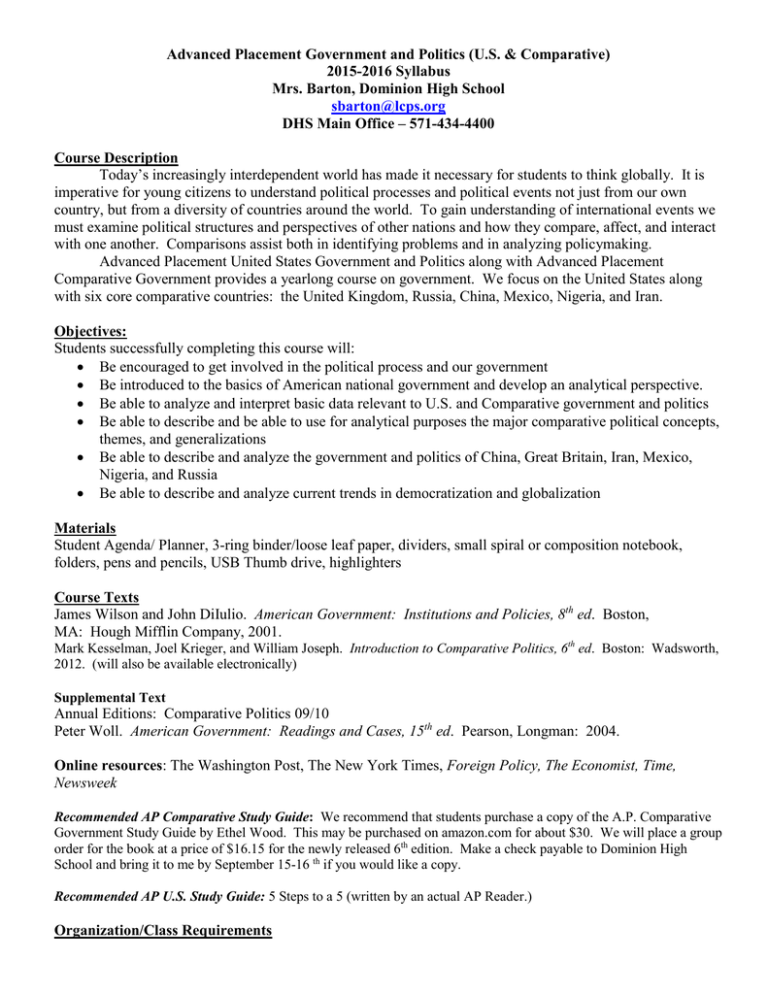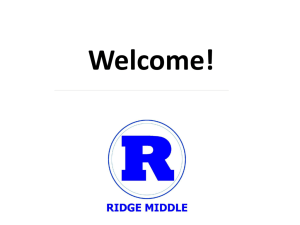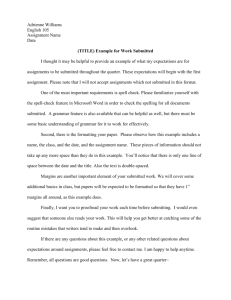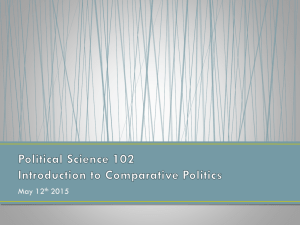
Advanced Placement Government and Politics (U.S. & Comparative)
2015-2016 Syllabus
Mrs. Barton, Dominion High School
sbarton@lcps.org
DHS Main Office – 571-434-4400
Course Description
Today’s increasingly interdependent world has made it necessary for students to think globally. It is
imperative for young citizens to understand political processes and political events not just from our own
country, but from a diversity of countries around the world. To gain understanding of international events we
must examine political structures and perspectives of other nations and how they compare, affect, and interact
with one another. Comparisons assist both in identifying problems and in analyzing policymaking.
Advanced Placement United States Government and Politics along with Advanced Placement
Comparative Government provides a yearlong course on government. We focus on the United States along
with six core comparative countries: the United Kingdom, Russia, China, Mexico, Nigeria, and Iran.
Objectives:
Students successfully completing this course will:
Be encouraged to get involved in the political process and our government
Be introduced to the basics of American national government and develop an analytical perspective.
Be able to analyze and interpret basic data relevant to U.S. and Comparative government and politics
Be able to describe and be able to use for analytical purposes the major comparative political concepts,
themes, and generalizations
Be able to describe and analyze the government and politics of China, Great Britain, Iran, Mexico,
Nigeria, and Russia
Be able to describe and analyze current trends in democratization and globalization
Materials
Student Agenda/ Planner, 3-ring binder/loose leaf paper, dividers, small spiral or composition notebook,
folders, pens and pencils, USB Thumb drive, highlighters
Course Texts
James Wilson and John DiIulio. American Government: Institutions and Policies, 8th ed. Boston,
MA: Hough Mifflin Company, 2001.
Mark Kesselman, Joel Krieger, and William Joseph. Introduction to Comparative Politics, 6th ed. Boston: Wadsworth,
2012. (will also be available electronically)
Supplemental Text
Annual Editions: Comparative Politics 09/10
Peter Woll. American Government: Readings and Cases, 15th ed. Pearson, Longman: 2004.
Online resources: The Washington Post, The New York Times, Foreign Policy, The Economist, Time,
Newsweek
Recommended AP Comparative Study Guide: We recommend that students purchase a copy of the A.P. Comparative
Government Study Guide by Ethel Wood. This may be purchased on amazon.com for about $30. We will place a group
order for the book at a price of $16.15 for the newly released 6th edition. Make a check payable to Dominion High
School and bring it to me by September 15-16 th if you would like a copy.
Recommended AP U.S. Study Guide: 5 Steps to a 5 (written by an actual AP Reader.)
Organization/Class Requirements
Reading Questions- (Formative Assessment, checked for completion, not scored)
This is a “readings” course, you will do a lot of reading and you will learn a lot of information. You are
responsible for reading at home and in class. (You will be assigned a login for an online copy of the
Kesselman text.) Students will be expected to read assigned chapters in both texts, as well as supplemental
readings, and complete study questions. Webquests will also be used to gather and learn information.
Reading Quizzes—(Formative Assessment, 2 per week, ~10 points each)
Students will be given a quiz following each reading assignment. Answers to Reading Questions will be able
to be used on quizzes.
In Class/Homework Activities (Formative/Summative Assessment, 2-4 per quarter, 5-20 points each)
Class Discussions - students will be expected to participate in class discussions which require them to analyze
and evaluate the text, supplemental reading materials, and related graphs and charts. Creative Activities –
students may make annotated maps, charts, posters, infographics, etc. Practice FRQs - students will be asked
to complete written responses, using knowledge gained from class discussions/lecture, activities and research.
Practice FRQs will be self or peer graded, using College Board rubrics.
Vocabulary Journals (Summative Assessment, 2-3 per quarter, ~ 20 points)
Students will keep a journal (small spiral or composition notebook) in which they will record key vocabulary
terms, definitions and examples. Journals will be checked on the day of each unit test.
Quarterly Writing Assignments—(Summative Assessment, 50-100 points)
There will be one major writing assignment per quarter.
1st quarter students will write a “political socialization auto ethnography” (analyzing their own
political beliefs).
2nd quarter students will complete an annotated bibliography for their policy research paper.
3rd quarter students will write a policy research paper.
4th quarter students will write an end of year reflection.
Project-Based Learning (Summative Assessment, 1 per semester, ~100 points)
Students will complete a project each semester involving significant content and important competencies,
authentic problems, technology, collaboration and product presentations.
Tests (Summative Assessment, 2-3 per quarter, ~75 points)
Tests will be composed of questions similar to those students can anticipate seeing on the AP exam including
multiple choice and free response questions. There will be an end-of-course, cumulative exam for US
Government at the end of the 2nd quarter.
*Summer Assignment will count for 60 points on the First Quarter.
*Assignments will be returned to students in the following manner: Quizzes and other formative assessments
(1-2 blocks), Tests (2-3 blocks), Major projects and writing assignments (2-3 weeks). Student scores will be
posted electronically within 2 weeks after the assignment is graded.
The Exams: AP United States Exam is Tuesday, May 10th
The AP U.S. Government and Politics Exam is 2 hours and 25 minutes long. It includes a 45 minute multiple
choice section consisting of 60 questions and a 100 minute free response section consisting of 4 questions.
This exam is administered in the morning.
AP Comparative Exam is Thursday, May 12th
The AP Comparative Government & Politics Exam is 2 hours and 25 minutes long. It includes a 45 minute
multiple choice section consisting of 55 questions and a 100 minute free response section consisting of 5 short
answer concept questions, 1 conceptual analysis question, and 2 country context questions.
Date
Quarter 1
Aug. 31 October 30
Quarter 2
November 4 January 29
Course Sequence (Based on A Day Dates) **Dates are subject to change**
AP US Government
Foundations for the Study of Government and Politics
Power, Authority and Legitimacy
Nations, States and Regimes
Ideologies and Economies
Comparative data introduction
Key Dates and Assignments
Unit 1 Test 9/15
Last day to turn in Summer Assignment 9/11
US Constitution and Federalism
United States Constitution and Foundations
Power Structures: Federal, Unitary, Confederal
Federalism Timeline
Key Dates and Assignments
Development project/presentation 9/17
Unit 2 Test 10/1
Political Culture, Political Participation & Public Opinion
Policy Process
Political Culture
Political Ideology, Social Movements, Political Change
Political Socialization, Social Cleavages, Political Polls
The role of the media in politics
Key Dates and Assignments
Political Socialization Essay 10/20
Unit 3 Test 10/22
Topic (Research Paper) – 10/30
Partnership Night Monday, November 2nd
The General Election is Tuesday, November 3rd
Linkage Institutions: Citizens in society and the state
Elections
Political Parties
Interest Groups
Key Dates and Assignments
Interest Group project/presentation 11/12
Source Sheet (Research Paper) 11/11
Unit 4 Test 11/16
Annotated Bibliography (Research Paper) 12/1
Political Institutions of Deliberation (Legislative Branch)
Congress: Powers and Activities
Congressional Elections
Policy Process: Fiscal Policy and Domestic Policy
Key Dates and Assignments
Quarter 3
February 1April 14
Comparative Electoral Systems Webquest 12/1
Unit 5 Test 12/7
Institutions of Enforcement and Executive Action (Executive Branch)
Article II
Bureaucracy
Fiscal, Monetary and Foreign Policy
Key Dates and Assignments
Unit 6 Test 1/4
Judiciary Branch & Civil Society
Authority
Organization of the court system
Interpretations of the courts
Civil liberties and civil rights
Democratization and globalization
Key Dates and Assignments
Annotated Outline (Research Paper) 1/8
Court Case presentation 1/12
End of Course Assessment 1/19
Second Semester – AP Comparative Politics & Government
United Kingdom & European Union
Power, Authority and Sovereignty
Institutions
Citizens, Society, and the State
Political & Economic Change
Key Dates and Assignments
Research Paper Draft – 2/1
UK/EU Test 2/18
Research Paper Final – 2/19
Former Communist Regimes/Authoritarian Systems: Russia & China
Communism
Russia & China
o Power, Authority and Sovereignty
o Institutions
o Citizens, Society, and the State
o Political & Economic Chang
Key Dates and Assignments
Socratic Seminar 2/24
Russia/China Test 3/3
Transitional Democracies: Mexico & Nigeria
Developing countries data
Cleavages
Mexico
o Power, Authority and Sovereignty
o Institutions
o Citizens, Society, and the State
o Political & Economic Change
Nigeria
o Power, Authority and Sovereignty
o Institutions
o Citizens, Society, and the State
o Political & Economic Change
Key Dates and Assignments
Mexico/Nigeria Test 4/1
Theocracy: Iran
Iran
o Power, Authority and Sovereignty Citizens, Society, and the State
o Political & Economic Change
o Institutions
Key Dates and Assignments
Iran Quiz 4/14
Quarter 4
April 18June 14
Review
Comparative Concepts
US Government Review
AP6 Review
Key Dates and Assignments
Comparative Concepts Test 4/21
AP UNITED STATES GOVERNMENT EXAM 5/10
AP COMPARATIVE GOVERNMENT EXAM 5/12
Post AP Exam
Policy Paper Presentations
Final Reflection
AP US Government & Comparative Government Syllabus Acknowledgement
I have read the syllabus for AP US & Comparative Government and am aware of the class expectations and
procedures. I have read the Dominion High School Academic Integrity Policy (located in the student agenda) and
have reviewed it with my child. I also have been informed of the methods to contact the teacher should a concern
arise.
_________________________________________
Student Signature
_____________
Date
_________________________________________
Parent Signature
_____________
Date
Student Information
Name: ________________________________________
Email:_________________________________________
Parent Information
Name: ________________________________________
Best Phone Number: _____________________________
Parent Email: ___________________________________
Does your student have access to the internet at home?
_____ Yes
_____ No






